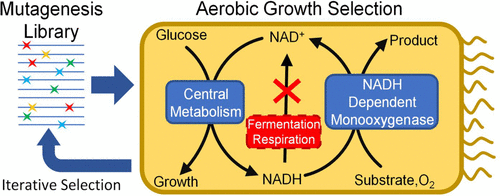当前位置:
X-MOL 学术
›
ACS Synth. Biol.
›
论文详情
Our official English website, www.x-mol.net, welcomes your
feedback! (Note: you will need to create a separate account there.)
Growth-Based, High-Throughput Selection for NADH Preference in an Oxygen-Dependent Biocatalyst
ACS Synthetic Biology ( IF 3.7 ) Pub Date : 2021-09-01 , DOI: 10.1021/acssynbio.1c00258 Sarah Maxel 1 , Samer Saleh 1 , Edward King 2 , Derek Aspacio 1 , Linyue Zhang 1 , Ray Luo 1, 2, 3 , Han Li 1, 3
ACS Synthetic Biology ( IF 3.7 ) Pub Date : 2021-09-01 , DOI: 10.1021/acssynbio.1c00258 Sarah Maxel 1 , Samer Saleh 1 , Edward King 2 , Derek Aspacio 1 , Linyue Zhang 1 , Ray Luo 1, 2, 3 , Han Li 1, 3
Affiliation

|
Cyclohexanone monooxygenases (CHMO) consume molecular oxygen and NADPH to catalyze the valuable oxidation of cyclic ketones. However, CHMO usage is restricted by poor stability and stringent specificity for NADPH. Efforts to engineer CHMO have been limited by the sensitivity of the enzyme to perturbations in conformational dynamics and long-range interactions that cannot be predicted. We demonstrate an aerobic, high-throughput growth selection platform in Escherichia coli for oxygenase evolution based on NADH redox balance. We applied this NADH-dependent selection to alter the cofactor specificity of CHMO to accept NADH, a less expensive cofactor than NADPH. We first identified the variant CHMO DTNP (S208D-K326T-K349N-L143P) with a ∼1200-fold relative cofactor specificity switch from NADPH to NADH compared to the wild type through semirational design. Molecular modeling suggests CHMO DTNP activity is driven by cooperative fine-tuning of cofactor contacts. Additional evolution of CHMO DTNP through random mutagenesis yielded the variant CHMO DTNPY with a ∼2900-fold relative specificity switch compared to the wild type afforded by an additional distal mutation, H163Y. These results highlight the difficulty in engineering functionally innovative variants from static models and rational designs, and the need for high throughput selection methods. Our introduced tools for oxygenase engineering accelerate the advancements of characteristics essential for industrial feasibility.
中文翻译:

在氧依赖性生物催化剂中基于生长的高通量选择 NADH 偏好
环己酮单加氧酶 (CHMO) 消耗分子氧和 NADPH 来催化环酮的有价值的氧化。然而,CHMO 的使用受到稳定性差和 NADPH 特异性严格的限制。由于酶对构象动力学扰动和无法预测的长程相互作用的敏感性,设计 CHMO 的努力受到限制。我们展示了大肠杆菌中的需氧、高通量生长选择平台,用于基于 NADH 氧化还原平衡的加氧酶进化。我们应用这种 NADH 依赖性选择来改变 CHMO 的辅因子特异性,以接受 NADH,这是一种比 NADPH 更便宜的辅因子。我们首先通过半理性设计鉴定出变体 CHMO DTNP (S208D-K326T-K349N-L143P),与野生型相比,其从 NADPH 到 NADH 的相对辅因子特异性转换约为 1200 倍。分子模型表明 CHMO DTNP 活性是由辅助因子接触的协同微调驱动的。CHMO DTNP 通过随机诱变进行的额外进化产生了变体 CHMO DTNPY,与额外远端突变 H163Y 提供的野生型相比,其相对特异性转换约为 2900 倍。这些结果凸显了从静态模型和理性设计中设计功能创新变体的难度,以及对高通量选择方法的需求。我们推出的加氧酶工程工具加速了工业可行性所必需的特性的进步。
更新日期:2021-09-17
中文翻译:

在氧依赖性生物催化剂中基于生长的高通量选择 NADH 偏好
环己酮单加氧酶 (CHMO) 消耗分子氧和 NADPH 来催化环酮的有价值的氧化。然而,CHMO 的使用受到稳定性差和 NADPH 特异性严格的限制。由于酶对构象动力学扰动和无法预测的长程相互作用的敏感性,设计 CHMO 的努力受到限制。我们展示了大肠杆菌中的需氧、高通量生长选择平台,用于基于 NADH 氧化还原平衡的加氧酶进化。我们应用这种 NADH 依赖性选择来改变 CHMO 的辅因子特异性,以接受 NADH,这是一种比 NADPH 更便宜的辅因子。我们首先通过半理性设计鉴定出变体 CHMO DTNP (S208D-K326T-K349N-L143P),与野生型相比,其从 NADPH 到 NADH 的相对辅因子特异性转换约为 1200 倍。分子模型表明 CHMO DTNP 活性是由辅助因子接触的协同微调驱动的。CHMO DTNP 通过随机诱变进行的额外进化产生了变体 CHMO DTNPY,与额外远端突变 H163Y 提供的野生型相比,其相对特异性转换约为 2900 倍。这些结果凸显了从静态模型和理性设计中设计功能创新变体的难度,以及对高通量选择方法的需求。我们推出的加氧酶工程工具加速了工业可行性所必需的特性的进步。











































 京公网安备 11010802027423号
京公网安备 11010802027423号